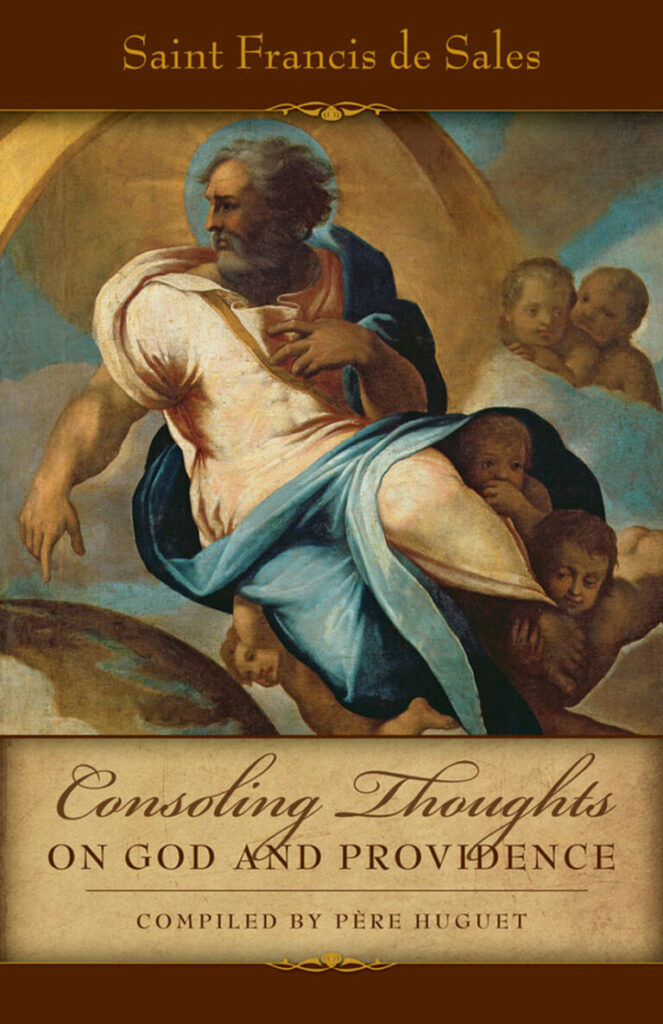Abandonment is the virtue of virtues; it is the cream of charity, the fragrance of humility, the sweetness of patience, and the fruit of perseverance. Great is this virtue, and worthy of being practiced by the beloved children of God.
“My Father,” says our good Savior on the cross, “into Thy hands I commend my spirit” (Luke 23:46). It is true He was pleased to say: “All is consummated,” and “I have accomplished all that Thou gavest me to do,” (John 19:30, and 17:4); but nevertheless, if it be Thy will that I remain still on the cross to suffer more, I am content; I resign my soul into Thy hands; do with it as pleases Thee.
Thus we should act on all occasions, whether in joy or sorrow; surrendering ourselves to the Divine Will, to be guided according to its good pleasure, without any concern about our own particular desires.
Our Lord loves with an extremely tender love all those who abandon themselves entirely to His paternal care, allowing themselves to be governed by His Divine Providence, without considering whether its dealings towards them are sweet or bitter, being assured that everything coming from His paternal Heart will be for their good and advantage.
Placing their confidence in God, they say:
“My Father, I commend my soul, my body, all that I possess, into Thy hands, that Thou mayest do with them in Thy love what pleases Thee; whatever happens, nothing will move me from my firm resolution of acquiescing in the divine will concerning me and all that belongs to me; I wish to bury my will in that of God, or rather I wish Our Lord to will in me and for me, according to His good pleasure: I cast the care of myself into His hands.”
Sometimes Our Lord wishes that souls chosen for the service of His Divine Majesty should nourish and fortify in themselves a resolution of following Him through all digusts, aridities, repugnances, and bitterness of a spiritual life, without consolation, tenderness, or enjoyment, and that they should believe themselves deserving of no other treatment; thus treading in the footsteps of our Divine Savior, without any support but the Divine Will.
Never shall we be reduced to such an extremity as to be unable to offer to the Divine Majesty a holy submission to the divine will.
We must possess a continual and imperturbable equanimity amid the great variety of human occurrences, and though all things change around us, remain immovable, with our eyes fixed on God alone. And though all things, I will not merely say around us, but even within us, should turn topsy-turvy; whether our souls be joyful or sorrowful, in peace or in trouble, in light or in darkness, in temptation or in repose, in happiness or in disgust, though the sun scorch, or the dew refresh; we should always keep our will fixed on the good pleasure of God, as its sole and supreme object.
It is true that we require great confidence to abandon ourselves, without any reserve, to Divine Providence; but when we do abandon all, Our Lord takes care of all, and disposes of all. But if we reserve anything which we are unwilling to confide to Him, He leaves us, as if He would say: You think yourselves sufficiently wise to manage that affair without Me; you can do so, and see what will come of it.
St. Magdalen, who was wholly abandoned to Our Lord, remained at His feet, and listened while He spoke; and when He ceased to speak, she ceased to listen, but she did not move away from Him; thus her soul, abandoned to Our Lord, remained in His arms as a child in the bosom of its mother, which, when she puts it down to walk, walks until its mother takes it up again, and when she carries it, allows itself to be caried.
It knows not, cares not, whither she goes; but is carried or led as its mother pleases; in like manner, the soul which loves the good pleasure of God in all that happens to it, either allows itself to be carried, or walks if necessary, doing at all times, with great care, the signified will of God.
This article is taken from part of a chapter in Consoling Thoughts on God and Providence by St. Francis de Sales which is available from TAN Books.









